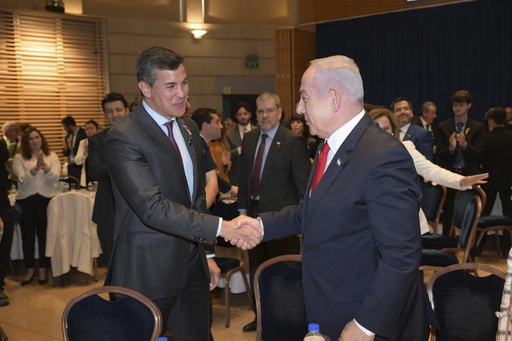JERUSALEM — Paraguay has officially reopened its embassy in Jerusalem as of Thursday, joining a select group of countries that accept the contentious city as the capital of Israel. This development is seen as a significant diplomatic achievement for Prime Minister Benjamin Netanyahu, who has been facing increased international isolation due to the ongoing war in Gaza.
Originally, Paraguay moved its embassy to Jerusalem back in 2018 under the administration of then-President Horacio Cartes, a strong advocate for Israel. However, this decision was reversed after a change in leadership later that year. The recent action taken by President Santiago Peña, who is closely aligned with Cartes and continues his pro-Israel policies, makes Paraguay the first nation to reopen its Jerusalem embassy following Hamas’ assault on October 7, which spurred the current conflict.
The status of Jerusalem remains one of the most complex issues within the Israeli-Palestinian conflict. While Israel regards the entire city as its capital, Palestinians claim East Jerusalem for their future capital. Israel had annexed East Jerusalem, which includes the Old City—home to crucial religious landmarks for Judaism, Christianity, and Islam—back in 1967. This annexation, however, did not receive recognition from the international community. Consequently, the majority of countries maintain their embassies in Tel Aviv instead of Jerusalem.
With this decision, Paraguay enters the company of a few other nations, including the United States, Honduras, Guatemala, Kosovo, and Papua New Guinea, all of which have embassy facilities in Jerusalem. The ceremony for the embassy’s reopening was marked by a palpable sense of optimism, with both Netanyahu and Israel’s new Foreign Minister, Gideon Saar, expressing their appreciation for President Peña’s support.
During the ceremony, Netanyahu addressed Peña as “my good friend Santiago,” and underscored the historical struggles faced by both nations. He reaffirmed that “Jerusalem is the capital of Israel,” promising that this stance would remain unchanged.
This event takes place against the backdrop of a severe humanitarian crisis in Gaza, which has invited a torrent of international criticism towards Israel. Recently, the International Criminal Court issued arrest warrants for Netanyahu and a former defense minister, accusing them of committing crimes against humanity amid the conflict. Thus far, the Israeli military offensive has reportedly resulted in over 44,800 Palestinian fatalities, predominantly women and children. These warrants raise concerns about potential legal repercussions for Netanyahu during international travel.
Despite these challenges, Peña has extended an invitation for Netanyahu to visit Paraguay. At the embassy inauguration, Netanyahu affixed a Jewish mezuzah—a traditional scroll bearing Torah verses—to the doorframe of the new Paraguayan establishment.
Saar articulated that Israel and Paraguay share a bond that is grounded not just in mutual interests but also in shared values. He announced plans to visit Asunción, Paraguay’s capital, accompanied by a delegation from Israeli businesses. During the ceremony, he and Paraguayan Foreign Minister Rubén Ramírez Lezcano formalized several bilateral agreements.
Peña expressed gratitude towards Netanyahu and emphasized his commitment to future partnerships, describing the embassy’s reopening as a significant endorsement of Israel. He stated, “This is very important for you. We recognize that this is a very strong statement. Israel is going to win, and the countries alongside Israel are also going to win.”
Despite housing a relatively small Jewish population compared to neighboring countries like Argentina and Brazil, Paraguay has emerged as one of Israel’s staunchest allies in Latin America. Other nations in this region, such as Guatemala and Honduras, have similarly strong evangelical foundations that support Israel’s claims. Evangelicals in the U.S. have played an influential role in shaping the Republican Party’s pro-Israel stance.
Paraguay’s current conservative government has strategically aligned itself with former and current U.S. President Donald Trump, further cementing its ties with both Israel and Taiwan—two pivotal issues for Republican leaders. Ramírez Lezcano notably met with Trump shortly after his election victory in November.
Earlier this year, Peña welcomed Senator Marco Rubio for a visit, marking a notable instance as it was the first visit by a U.S. senator to Paraguay in four decades. This resurgence in Paraguay’s relations with Israel follows a period of tension when former President Mario Abdo Benitez closed the Jerusalem embassy, prompting Israel to temporarily shutter its own embassy in Asunción.
During Cartes’ presidency, Paraguay quickly aligned with Trump’s decision to relocate the U.S. embassy to Jerusalem, departing from decades of diplomatic protocol that regarded the city’s status as a matter for peace negotiations.
